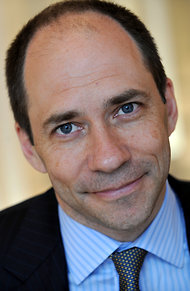Donald E. Graham, chairman and chief executive of The Washington Post Company, and the third generation of the Graham family to lead the paper, told the staff about the sale late Monday afternoon. They had gathered together in the newspaper’s auditorium at the behest of the publisher, Katharine Weymouth, his niece.
“I, along with Katharine Weymouth and our board of directors, decided to sell only after years of familiar newspaper-industry challenges made us wonder if there might be another owner who would be better for the Post (after a transaction that would be in the best interest of our shareholders),” Mr. Graham said in a written statement.
In the auditorium, he closed his remarks by saying that nobody in the room should be sad — except, he said, “for me.”
The announcement was greeted by what many staff members described as “shock,” a reaction shared in newsrooms across the country as one of the crown jewels of newspapers was surrendered by one of the industry’s royal families.
In Mr. Bezos, The Post will have a very different owner, a technologist whose fortunes have risen in the last dozen years even as those of The Post and most newspapers have struggled. Through Amazon, the retailing giant, he has helped revolutionize the way people around the world consume — first books, then expanding to all kinds of goods and more recently in online storage, electronic books and online video, including a recent spate of original programming.
In the meeting, Mr. Graham stressed that Mr. Bezos would purchase The Post in a personal capacity and not on behalf of Amazon the company. The $250 million deal includes all of the publishing businesses owned by The Washington Post Company, including the Express newspaper, The Gazette Newspapers, Southern Maryland Newspapers, Fairfax County Times, El Tiempo Latino and Greater Washington Publishing.
The Washington Post company plans to hold on to Slate magazine, The Root.com and Foreign Policy. According to the release, Mr. Bezos has asked Ms. Weymouth to remain at The Post along with Stephen P. Hills, president and general manager; Martin Baron, executive editor; and Fred Hiatt, editor of the editorial page.
Mr. Bezos, who did not attend the meeting at The Post on Monday, said in a statement that he had known Mr. Graham for the past decade and said about Mr. Graham that “I do not know a finer man.” Ms. Weymouth said that in negotiating this deal, Mr. Bezos made it clear he was not purely focused on profits.
The sale, at a price that would have been unthinkably low even a few years ago, represents the end of eight decades of ownership by the Graham family of The Post since Eugene Meyer bought The Post at auction on June 1, 1933. His son-in-law Phillip L. Graham served as president of the paper from 1947 until his death in 1963. Then Graham’s widow, Katharine Graham, oversaw the paper through the publication of the Pentagon Papers alongside The New York Times and its coverage of Watergate, the political scandal that led to the resignation of Richard Nixon and also a starring role for the newspaper in the film, “All The President’s Men.”
The Post’s daily circulation peaked in 1993 with 832,332 average daily subscribers, according to the Alliance for Audited Media. But like most newspapers, it has suffered greatly from circulation and advertising declines. By March, the newspaper’s daily circulation had dropped to 474,767.
The company became pressed enough for cash that Ms. Weymouth announced in February that it was looking to sell its flagship headquarters. According to a regulatory filing associated with the sale, Mr. Bezos will pay rent to The Post Company on the space for up to three years.

Michael D. Shear, Sheryl Gay Stolberg and Sarah Wheaton contributed reporting.
This article has been revised to reflect the following correction:
Correction: August 5, 2013
An earlier version of this article misstated the middle initial of the founder of Amazon.com. He is Jeffrey P. Bezos, not Jeffrey K.
Article source: http://www.nytimes.com/2013/08/06/business/media/amazoncom-founder-to-buy-the-washington-post.html?partner=rss&emc=rss

